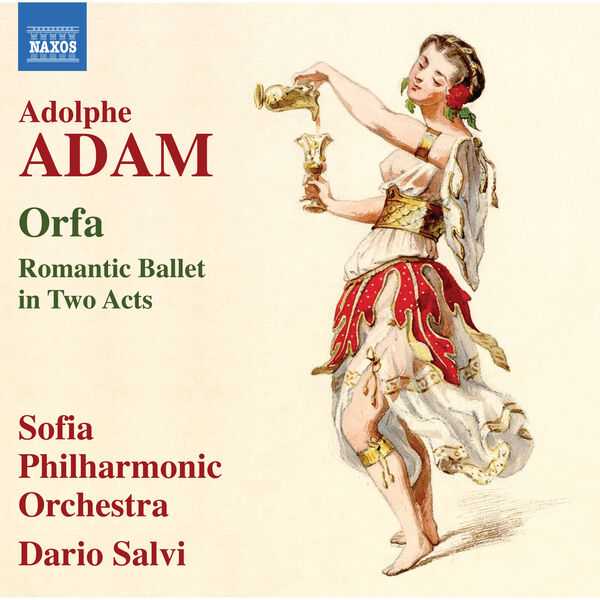
Composer: Adolphe Adam
Performer: Vesela Trichkova, Kalina Hristova
Orchestra: Sofia Philharmonic Orchestra
Conductor: Dario Salvi
Format: FLAC (tracks)
Label: Naxos
Catalogue: 8574478
Release: 2023
Size: 355 MB
Recovery: +3%
Scan: yes
Orfa
Act I
01. Introduction “Le rendez-vous”
02. Pas de trois “Les scandinaves”
03. Pas de deux “Les fiancés”
04. Mazurka “Les traîneaux”
05. Après le divertissement
Act II
06. Les séductions
07. Part 2
08. Pas de deux et Apothéose
Orfa was Adolphe Adam’s penultimate ballet, with an intriguing scenario based on Nordic mythology. It shares analogies with Hesiod’s Theogony and Wagner’s Ring cycle in depicting the struggle between the older gods (Loki) and younger gods (Odin). Full of archetypal Romantic elements, Orfa was mounted with the lavish stage spectacle for which the Paris Opera was famous, and featured Fanny Cerrito in the title role. Adam’s writing shows increasingly vivid orchestral imagination, drama and tonal colour, with roles for several instrumental soloists. This world premiere recording uses a new edition copied from Adam’s original manuscript score held at the Bibliothèque nationale de France.
Composer Adolphe Adam exerted a great influence on the development of both ballet and opera in 19th century France, but, except for the ballet Giselle (1841) and perhaps Le Corsaire (1856), he is mostly forgotten today. Conductor and musicologist Dario Salvi has specialized in the revival of obscure 19th century repertory, and he has hit on a real prize with Adam’s Orfa, the composer’s penultimate ballet. The plot is a bit difficult to describe concisely. The ballet has a Nordic setting, and the tale overlaps a bit with that of Wagner’s Ring cycle, an incongruous effect when paired with Adam’s graceful, evanescent music. This doesn’t matter much (although it may explain why stage revivals have been nonexistent), for Adam, here as elsewhere, is a sublime melodist whose inspiration seems not to have flagged as he got older. The score is colorful, with a mazurka, a vaguely pictorial “Les Scandinaves,” and a passage of “Les Séducdtions.” All are overflowing with melody, and the final “Pas de deux et Apothéose” is genuinely transcendent. The Sofia Philharmonic is competent and smooth, but Salvi’s performance is based on his own new edition of the score, and it is to be hoped that the score inspires other orchestras to pick the work up. Any orchestral audience would find this music delightful.